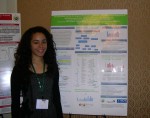This past summer I had the opportunity to take part in a life-changing research experience at Harvard University’s Harvard Forest. My research was on forest microbial communities and how they are being affected by climate change. My mentor and I compared data from long-term soil warming plots at the Forest as well as data collected by the National Ecological Observatory Network (NEON). We then processed our data against various databases to identify the genes being expressed among the microbial communities. This new knowledge will help us understand the microbes’ role in cycling greenhouse gases.
Mentorship beyond the summer
After concluding a wonderful summer filled with endless opportunities for hands-on research, educational seminars and the daily opportunity to interact with and learn from my peers and their mentors, my summer mentor Dr. Jeff Blanchard offered me the opportunity to continue this research in his lab at University of Massachusetts-Amherst. This was perfect timing. I was in the process of transferring from Essex County College and the transition was made possible through the caring staff at Harvard Forest and Dr. Blanchard.
Shortly after, I was informed that I had been nominated to attend a national conference for REU students in Arlington, Virginia, in late October (officially, the Conference of Research Experiences for Undergraduates Student Scholarship). It would be my first conference and my first scientific poster to date. I was so grateful for the opportunity.
The REU conference
Attending this conference was another life-changing event for me. Meeting other REU students from various disciplines within Science, Technology, Engineering, and Mathematics (STEM) and learning how their experiences shaped their future career showed me how important programs like the Harvard Forest LTER are in shaping our lives as students and future professionals. The workshops that I was able to attend in between poster sessions also prompted me to question what it is that I want from a career in STEM: how can I use it for the greater good of my community?
The conference enabled us to meet with current PhD students and mentors from universities across the U.S. as well as staff from the National Science Foundation (NSF) and the Council on Undergraduate Research (CUR). We were able to ask them what their life is like in a STEM career and what led them to where they are. Questions like these may sound simple, but the questions, and moreover their answers, have truly helped me pin-point what I want to do in the future. Many undergraduates confidently profess to know for certain what it is they want to do with their lives. However, at least for me, my summer at Harvard Forest, and now my experience at the REU conference, has truly changed my life, and helped place me in a position to be all that I can. I look forward to taking my STEM career as far as possible; after all, sky is no longer the limit.
By Sonia Filipczak, REU student (HFR)

 Enlarge this image
Enlarge this image